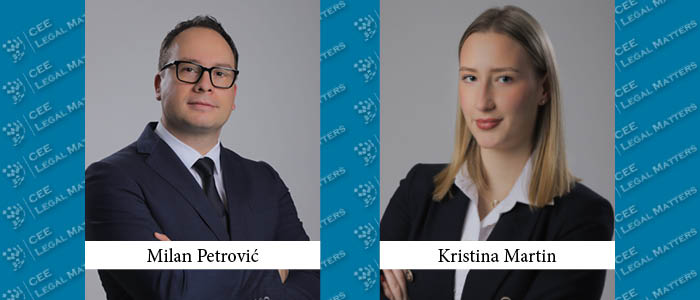On January 1, 2024, the amendments to the Law on Fees for the Use of Public Goods, published in the Official Gazette of RS No. 92/2023 (“the Law”), came into effect.
Below is an overview of the most significant changes.
Reasons for amending the Law
When drafting the Law amendments, the following reasons were cited:
- preventing the avoidance of fees for the use of public goods;
- reducing the burden regarding certain fees, i.e., for certain categories of fee payers;
- harmonization with regulations from other areas (primarily with provisions related to energy, i.e., energy efficiency and rational use of energy, and electronic communications, i.e., radio frequencies); and
- technical-legal harmonization and clarifications.
Major changes to the Law
The most significant amendments to the Law include the following:
- Fee for geological exploration: The Law now stipulates that this fee also covers the fee for using data and documentation from basic and applied geological explorations conducted for the needs of the Republic of Serbia, financed from the budget of the Republic of Serbia.
- Fee for changing the purpose of agricultural land: The Law specifies that a request to change land use can be submitted when a different purpose is planned through the relevant spatial plan (previously, this was only possible when another purpose was planned by a separate act of local self-government). Additionally, the method of determining the fee base has been changed. It is also clarified that if agricultural land’s purpose is changed to construction in a spatial plan, it must still be used for agricultural production until it is actually converted. In such cases, the fee payer must settle the fee before obtaining a construction permit.
- Drainage fee: It’s specified that a user includes not only the owner or user of land and facilities in the drainage area but also the user of immovable property in public ownership and the manager of a public road or railway infrastructure. An exception is made for individuals and entrepreneurs who are owners or users of land and facilities in the drainage area registered in the Register of Agricultural Holdings or buildings registered in various official registers if also registered in the Register of Agricultural Holdings.
- Environmental pollution fees: These fees include fees for plastic bags, defined as packaging made of plastic material, with or without handles, available in retail establishments and intended for carrying goods or products. The fee payer for environmental pollution caused by plastic bags is the manufacturer or importer of plastic bags, except for compostable bags according to standard SRPS EN 13432:2005.
- Fee for environmental protection and improvement (eco-tax): To standardize the business environment for all entities performing identical activities, the Law now considers branches of foreign legal entities performing certain environmentally impacting activities as fee payers. It further specifies what constitutes activity (undertaking activities by legal entities, entrepreneurs, and branches of foreign legal entities in headquarters and separate business units) and a separate business unit (business premises and rooms outside headquarters where activities are carried out, including activities on construction sites lasting continuously for more than 12 months). Additionally, the deadline for submitting applications for this fee has been changed to April 30 (previously July 31, as mentioned in our previous articles available here and here), and the fee will now be paid quarterly instead of monthly. The fee’s base is the level of negative impact caused by the activity, also defined by the Law.
- Fee for direct water pollution: The Law states that this fee consists of two parts and is determined based on the measured total quantity of discharged wastewater annually (measured on a continuous flow meter at the discharge point into the recipient or based on data on the quantity of water taken or supplied to the fee payer if they do not measure the quantity of discharged wastewater or if the measured quantity is not in line with the water balance in the technological process).
- Fee for the use of public spaces: It clarifies what constitutes using public space for advertising (using advertising media placed in public areas or on surfaces of buildings located in public areas, or using building surfaces or advertising media on non-public surfaces when it directly impacts the availability, quality, or other characteristics of the public space, requiring permission from the competent authority of local self-government). It also defines direct impact on the availability of public space and impact on its quality or other characteristics. The fee base is the area determined by the permit issued by the competent authority of local self-government or other acts in the case of using public space without permission (expressed in m2). The fee calculation is based on the area of space, advertising media, or technical and operational characteristics of the building or advertising media, proportional to the approved period of use determined by the permit issued by the competent authority of local self-government.
- Fee for the use of protected areas: The Law empowers the minister responsible for environmental protection to prescribe activities directly contributing to improving the state, presentation, and promotion of the values of protected areas, as well as criteria for receiving benefits, the procedure for obtaining benefits, including deadlines for submitting requests, and the deadline for deciding on submitted requests.
- Fee for the use of parts of road land and other land used by the road authority that are in general use: The Law specifies that using parts of road land and other land used by the road authority includes using land occupied by constructing a traffic junction on a road plot, and exceptionally (in settlements) using road land for parking as a public road’s accompanying feature if it’s specified in technical documentation for construction or reconstruction. The fee base is the m2 of road land occupied by constructing a traffic junction on a road plot, and payment is made monthly, by the 15th for the previous month. The fee calculation starts from the date of receipt of the decision confirming the conditions for constructing or reconstructing the traffic junction.
This article is to be considered as exclusively informative, with no intention to provide legal advice. If you should need additional information, please contact us directly.
By Milan Petrovic, Managing Partner, and Kristina Martin, Junior Associate, PR Legal


